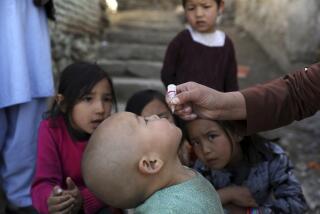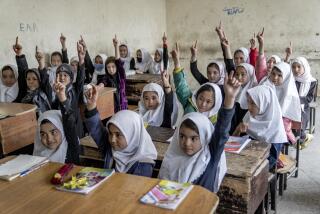Study: Afghans paid nearly $4 billion in bribes last year
KABUL, Afghanistan -- Afghans paid bribes totaling about $3.9 billion last year -- twice the country’s domestic revenue -- and two-thirds of the population says it’s acceptable for civil servants to take kickbacks for providing basic services, according to a U.N. survey released Thursday.
The results indicate corruption is deeply rooted in Afghanistan despite President Hamid Karzai’s pledges to clean up the problem and years of internationally backed efforts to curb the country’s extensive networks of bribery and patronage.
The data also point to the toxic impact of the billions of dollars in foreign aid and contracts that have poured into Afghanistan over the last decade, inflating even the cost of bribes. While fewer Afghans than in 2009 reported making such payoffs, the total cost of the bribes jumped by 40%, suggesting that poorer Afghans were less likely to be able to afford public services.
“We see some improvements, but by the same token, the problem is extremely serious,” said Jean-Luc Lemahieu, regional representative for the U.N. Office of Drugs and Crime, which released the survey along with the Afghan government’s anti-corruption body. “Corruption is rampant in Afghanistan and the perception of the population is we cannot escape this.”
The survey polled 6,700 Afghans from across the country and found that half of them paid a bribe to a public sector worker in 2012. That figure was down from 59% in 2009, the last year the survey was conducted.
But 68% of those polled said that it was acceptable for civil servants to augment their low salaries by taking small bribes from people in exchange for providing public services. A similar figure said it was sometimes acceptable for a civil servant to be hired based on family ties or friendships.
Among the most troubling findings, the survey’s authors said, was that education had become one of the government sectors most plagued by graft. Fifty-one percent of respondents said they paid a bribe to a teacher in 2012, up from 16% in 2009.
The data are a worrying sign for Karzai and his Western sponsors, who say that endemic corruption undermines public confidence in the government and pushes some Afghans to support the Taliban.
“It says the rich who can easily pay get better access to services, while the poor who cannot pay may not get access,” Lemahieu said. “That alienates a lot of the population, makes them frustrated, and in the worst scenario can fuel the insurgency.”
The U.N. and Afghanistan’s High Office for Oversight and Anticorruption also polled civil servants and found that more than half of the country’s teachers and police officers -- and nearly 30% of public prosecutors -- had gotten their jobs through personal, tribal or ethnic connections. More than 21% of teachers said they paid a bribe to get their job.
Despite Karzai’s repeated pledges, the Afghan government has done almost nothing to rein in corruption at any level. With the international military presence winding down, U.S. officials say that much of their future support to the Afghan government will be conditional on cleaning up corruption.
But Karzai himself has sometimes seemed ambivalent about the nature of the problem and has accused foreigners of fueling corruption by awarding contracts to top Afghan officials or their relatives to curry favor with his government.
In a speech in December, Karzai said “the large part” of corruption in his country was “hundreds of millions dollars that are not ours. We shouldn’t blame ourselves for that. That part is from others and imposed on us.”
ALSO:
Restoration starts at crumbling ancient city of Pompeii
Tunisian opposition leader Chokri Belaid shot dead outside his home
U.S. drone use could set dangerous example for rogue powers
More to Read
Sign up for Essential California
The most important California stories and recommendations in your inbox every morning.
You may occasionally receive promotional content from the Los Angeles Times.











